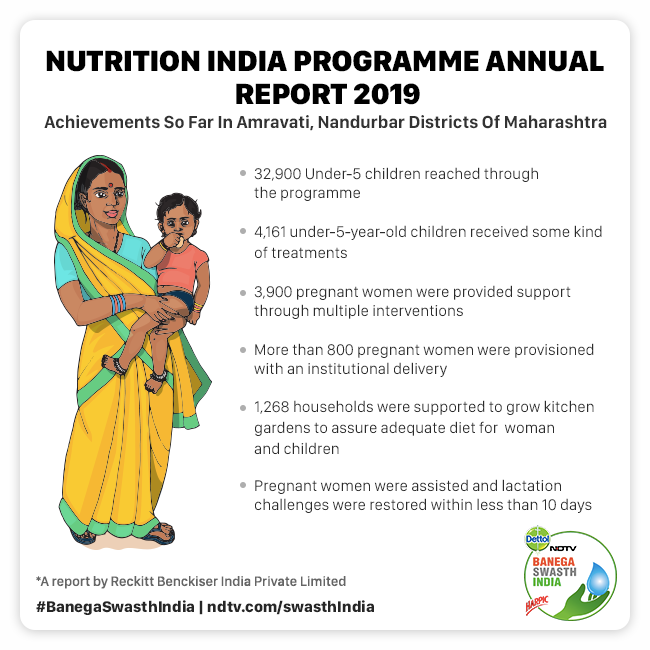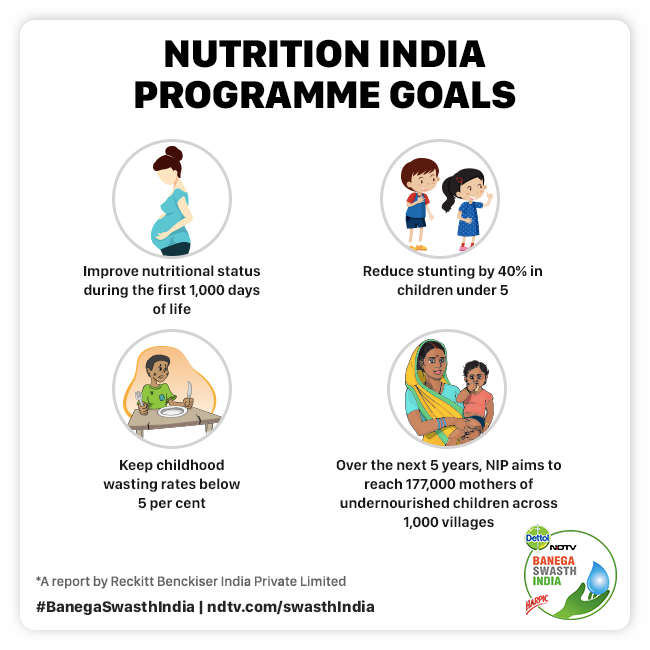New Delhi: Child malnutrition has emerged as a silent national emergency and the greatest human development challenge for India, it has always remained in the limelight with many reports that have been published over the past few years. Reckitt Benckiser, committed to a world where people live healthier and live better, has taken it upon themselves to work with the development sector, to create sustainable models of development, for some of India’s most vulnerable populations.
Also Read: Child, Maternal Malnutrition Led To 68 Per Cent Under-Five Fatalities In India
Keeping ‘nutrition’ in mind, Nutrition India Programme has been conceptualised, which brings a mutuality, collective capacity and immediacy of action to work together, work with technology, work with communities and work with successful interventions accelerate and propagate solutions more rapidly onto the ground. The programme is presently working to support the government to end malnutrition in Maharashtra, in the districts of Amravati and Nandurbar, the state’s toughest regions. Here are the top highlights of the report and the positives that have been achieved in the span of 10 months:
1. Goals Aimed: Through the Nutrition India Programme the goal is to improve nutritional status during the first 1,000 days of life, with a goal of reducing stunting by 40 per cent in children under 5 and keeping childhood wasting rates below 5 per cent. Over the next 5 years, the Nutrition India Programme also aims to reach 177,000 mothers of undernourished children across 1,000 villages.
Talking about the strategy and how Nutrition India Programme aims to change the lives of most vulnerable people, Gaurav Jain, Senior Vice President, Health South Asia Reckitt Benckiser, said,
Undernutrition occurs at all ages, but when it occurs early in life, it has its most devastating and profound effects that last well into the lifespan, as well as into the next generations. The first 1000 days of a child’s life, including 9 months of pregnancy, and 24 months of postnatal life, are critical when designing interventions that address malnutrition in all its forms. The nutrition provided in the period between conception and the child’s second birthday is critical for the optimum cognitive and physical development of the child. Keeping these basics in mind, we had developed the Nutrition India Programme.
Also Read: Concerted Efforts Can Make India Free From Malnutrition: Experts
2. On Ground Strategy: The Nutrition India Programme aims to train and make Community Nutrition Workers within the section of society so that they can train and motivate other women, men and children of their communities to build a healthy lifestyle. Highlighting the on-ground things done, Ravi Bhatnagar, Director- External Affairs and Partnerships, AMESA RB Health added,
We are working with local communities to build up a workforce of travelling Nutrition Workers, who are rigorously trained by a team of public health experts, paediatricians, gynaecologists and community development specialists. Going from village to village, these nutrition workers deliver simple and effective messaging around nutrition and hygiene to create behavioural nudges using specially designed games, nutrition kits, multimedia stimuli, and community festivals. Technology has been deployed in various forms across the programme, most importantly, the entire programme hinges on its synchronization with local health cultures and close collaboration with a network of traditional health providers and the communities who are not passive beneficiaries but key actors in the process of transformation.
3. Achievements: In the last few months because of the Nutrition India Programme, more than 32,000 under the age of 5-year-old children have been reached by the interventions carried out under the programme. Moreover, around 4,000 children have been provided with some kind of essential treatment in order to fix the nutrition-related problems in them. The programme identified, 4,192 pregnant women, of which, 3900 were provided support through multiple interventions.
Not just that, out of 861 pregnant women due in 2020 within Maharashtra where the programme was working, 800 were provisioned with an institutional delivery through programme assistance. Highlighting more details on the achievements, Mr Bhatnagar added,
The programme focuses on the remote region of Maharashtra, India, where malnutrition rates in children under five are 1.5 times the national average. The aim of NIP is to work with local communities to develop a workforce of travelling Community Nutrition Workers (CNWs), who can within their regions create nutrition-efficient societies or clusters.
Also Read: Global Hunger Index 2019 Highlights The Crisis Of Wasting And Stunting Among The Children In India
4. Breastfeeding Challenge: One of the most important clusters in the Nutrition India Programme is RB’s breastfeeding pledge, which basically means that the organisation understand the importance of mothers milk or breastfeeding for both the new mother and the newborn, therefore the organisation has pledged to educate women and their families to opt for breastfeeding as a practice as soon as the birth is given and continue it for their first 6 months of life. The report also highlights that in India mere 41.6 per cent newborn babies are breastfed within the first hour of their birth. Moreover, the report said that only 54.9 per cent of babies are exclusively breastfed.
To improve these numbers, RB via Nutrition India Programme has decided to train its nutrition warriors on the importance of breastfeeding so as more and more newborn babies can be breastfed within the first hour of their birth and exclusively for straight six months.
In Amravati and Nandurbar, Maharashtra where the programme has been in place, RB has figured out the “lactation failure” challenges. As per the ground observation, few mothers complained of insufficient breast milk, which is believed to be due to poor health, anaemia and not eating enough nourishing foods. The Nutrition India Programme intervened and in the last 10 months, 1,268 households were supported to grow kitchen gardens to ensure adequate diet diversity among woman and children. Along with this, pregnant women were assisted and lactation challenges were restored within less than 10 days.
These mothers were also supported and counselled by the workers of Nutrition India Programme for proper positioning, attachment and expression of breast milk which resulted in the continuity of breastfeeding.
Also Read: How Did This Chhattisgarh District Become The ‘Breastfeeding Champion’ Of The Country

Here are the top highlights of the report and the positives that have been achieved in the span of 10 months by Nutrition India Programme
Way Forward
Going forward in Maharashtra, the model will be implemented by the Community Nutrition Workers in the next 204 villages spread across four blocks of Dharni and Chikaldhara in the districts of Amravati and Akrani, Akkalkuwa of Nandurbar. Moreover, the following innovations are planned in the second year of the intervention,
– Strategy to ensure safe childbirth,
-Community based entrepreneurships,
– Introduction of mobile application based digital weighing and measurement machine,
– Breastfeeding pods at local markets, to name a few.





























